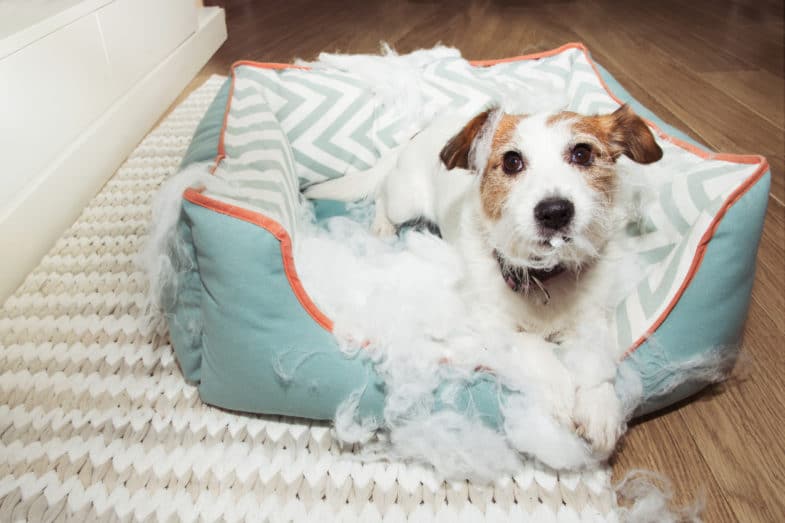How to Stop a Dog from Chewing its Bed

We’ve all been there. Finally arriving home from work after a long day, you’re surprised to find your dog greeting you with more gusto than usual. At least somebody missed you while you were gone, right? Yet their delight soon becomes clear the moment you walk into the living room. Your dog’s bed, lying in tatters, makes your living room floor resemble that of a sheep-shearing business’s.
How you do stop your dog’s relentless crusade to turn every bed you think they’ll love into a chew toy? This article explores their motives, how to suppress these impulses, and the importance of buying them the right bed that won’t give up the fight so easily.
Why do dogs bite their beds?
- Boredom, stress, and anxiety: Dogs are incredibly social creatures and thrive in packs. Accordingly, they hate to be left alone, to such an extent that they develop coping tactics to curb their boredom, anxiety, and stress. One common tactic developed due to separation anxiety is, of course, destroying their beds.
- Natural Instincts: Humans love of puppy eyes, puppy fat, and large paws distract us from the fact that dogs are omnivores and possess an innate urge to hunt. This impulse is the same one that drives them to destroy their beds. As a bed is soft and fluffy – just like prey dogs would commonly hunt like squirrels and rabbits – bed chewing functions as a way to curb their natural instincts. If you need more proof, properly watch the way in which your dog tears up their bed. If they firstly hold the bed down with their front feet, bite down, then use their neck muscles to pull the bed upwards, you’re witnessing a hunting technique perfected by your dog’s ancestors.
- A habit carried through from puppyhood: We’re sure you have fond memories of your dog being a puppy: the first time they successfully used a potty pad, the wonder in their eyes on their first walk. and the moment they discovered treats. Yet the stage nobody misses from puppyhood is around the three-month mark when they start the teething process, chewing everything and anything in sight to relieve the pain. One of these habits that tends to carry itself through to adulthood is dog chewing: although your dog is smart enough to know that biting humans with their adult teeth is a big no-no, their bed doesn’t react, making it a viable chewing candidate for destructive chewing.
How to put an end to this destructive behavior
- Drive them to exhaustion: Going out for a run? Bring your dog along. Heading out to the store to buy a few essentials? Leave your dog sitting outside. We guarantee that your dog will fall into a deep sleep as soon as their head hits the pillow. Not only will they love spending time with you, the more exhausted they become, the less likely they’ll want to spend time tearing apart their bed.
- Distract them when you’re gone: Leaving the radio or the television on whilst you’re out the house distracts dogs suffering from boredom, resulting in them diverting their attention away from their poor bed.
- Get your dog an obligatory bed for chewing: This may seem like a bizarre request; but hear us out. Redirecting your pup towards a bed they’re allowed to chew is much like giving a child a chocolate bar around Easter instead of the Easter egg being saved for the occasion: their cravings will be quelled.
- Redirect them towards a chew toy: If you’re hesitant about allowing your pup to tear into a surrogate bed so they’ll leave their expensive orthopedic or raised dog bed alone, why not give them a chew toy? If you see your dog tearing into their bed, redirect them towards this toy gently – negative reinforcement like shouting and pulling your dog’s bed away from them will only confuse them. The next stage of this process is using your body language towards the bed as a redirection tool. Wrapping your arms around their bed, ensure your dog is watching as you calmly communicate that you and this bed have a relationship. This physical statement should deter them from destroying their bed in the future.
- Get them a sturdy bed to sleep on: Let’s get real for one moment. Although we can blame the fact your dog destroys every bed you buy for them on their natural instincts, your work schedule, or a habit developed through teething as a puppy, the fact of the matter is the quality of the dog beds you buy aren’t good enough. Therefore, it’s time to accept the price tag and purchase your canine a bed that will actually last.
Orthopedic Beds
We believe that the definition of the adjective orthopedic – “designed to be used by people with injuries or diseases affecting their bones, muscles, joints, and ligaments” – fails to account for troublesome pups who derive great pleasure from using their dog bed as a giant dog chew toy! Many dog owners buy their pup an orthopedic dog bed as a preemptive measure due to canines’ unusual body shape making them prone to back problems, and we suggest you do the same. Destructive bed chewing will be kept to a minimum due to the durable polyester or poly cotton predominantly used to ensure this bed will last for years to come.
Raised Dog Beds
These chew-resistant dog beds are practically indestructible. Not only will you enjoy coming home at night to find your dog bed still intact due to the stretched surface and popular powder coated metal frame sides, your robot vacuum will be able to slide underneath to clear away your dog’s residual hairs from shedding. And if you don’t own one, this type of bed is incredibly easy to disassemble to make way for a normal-sized vacuum.
